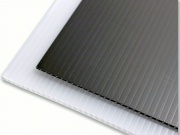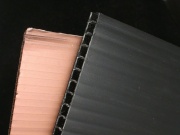Coroplast
Description
[PEL] A brand name for a rigid corrugated plastic board sandwiched between two sheets of thin Plastic. Coroplast® is composed of a high-impact copolymer of Polypropylene and Polyethylene. The moisture repellent sheets are light, strong, and acid-free. Coroplast® boards are used for enclosures, frames, backing, and supports. Chemically, the sheet is inert, with a NIL pH factor. At regular temperatures most oils, solvents and water have no effect, allowing it to perform under adverse weather conditions or as a product component exposed to harsh chemicals. All Coroplast® twin-wall profile sheets can be modified with additives, including UV protection, anti-static, flame retardant and color.
Synonyms and Related Terms
Silmilar products: Polyflute
Applications
- Enclosures and frames
- Storage boxes and trays
- Backing, lining and support
Personal Risks
Coroplast® is combustible and may release harmful toxins at temperatures of 600 degrees F.
See Coroplast® health and safety sheet [[1]]
Collection Risks
Some products may contain additive and coatings.
Physical and Chemical Properties
Sheets that are 4 mm thick will not burst on Mullen tester. May degrade in sunlight.
| Melting Point | 162.2 |
|---|---|
| Density | 90 g/cc |
Working Properties
Coroplast® may be cut or scored with a utility knife and bent with heat. It also may accumulate a static charge.
Forms/Sizes
Available in a variety of thicknesses ranging from 2-6 mm.
Resources and Citations
- Preservation Equipment: Website
- Rachael Perkins Arenstein, Lisa Goldberg, and Eugenie Milroy, ‘Support and Rehousing for Collection Storage’ In ‘Preventive Conservation: Collection Storage’ Lisa Elkin and Christopher A. Norris (eds.), Society for the Preservation of Natural History Collections, New York. 2019.
- National Park System, Conserv O Gram, Number 8/2, 'Safe Plastic & Fabrics for Display & Storage': Link
- Pam Hatchfield, Pollutants in the Museum Environment, Archetype Press, London, 2002
- A Glossary of Paper Conservation Terms, Margaret Ellis (ed.), Conservation Center of the Institute of Fine Arts, New York City, 1998
- Website address: www.preservationequipment.com/367.html

